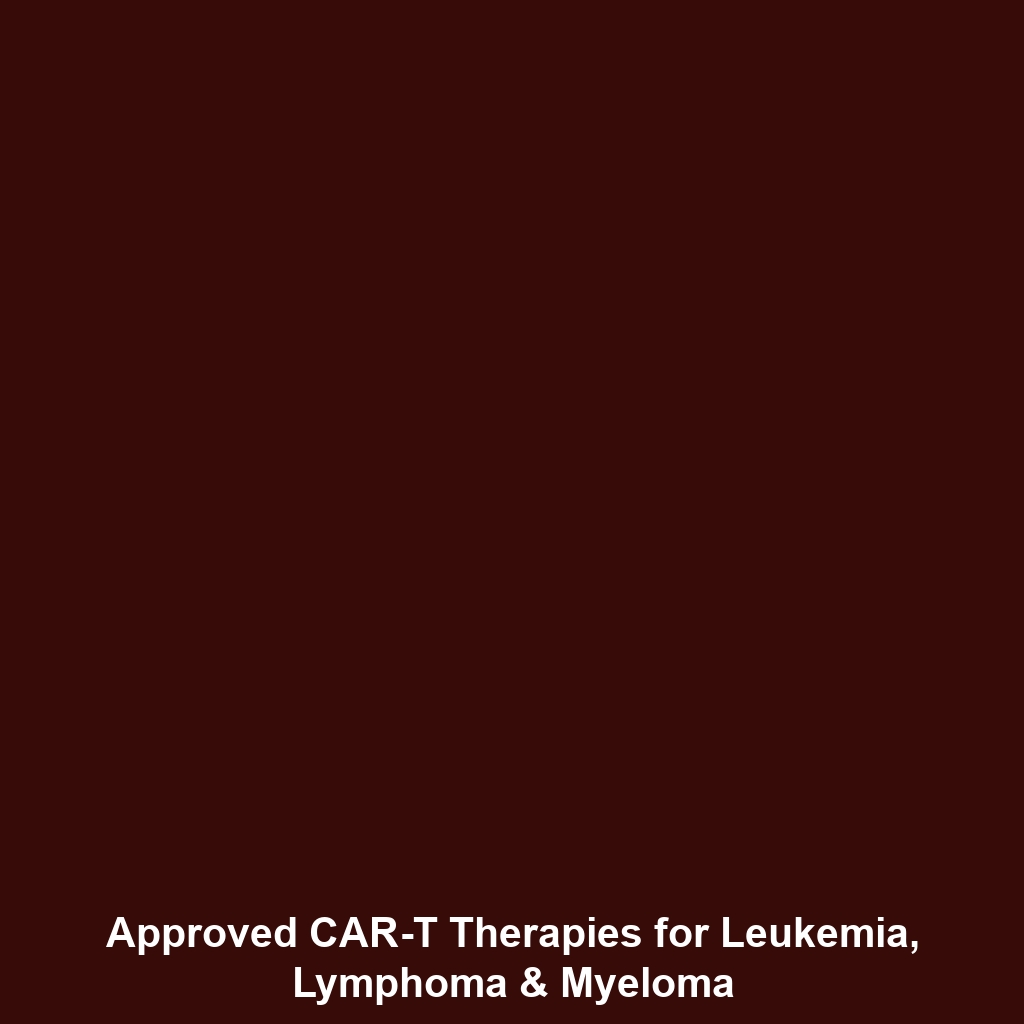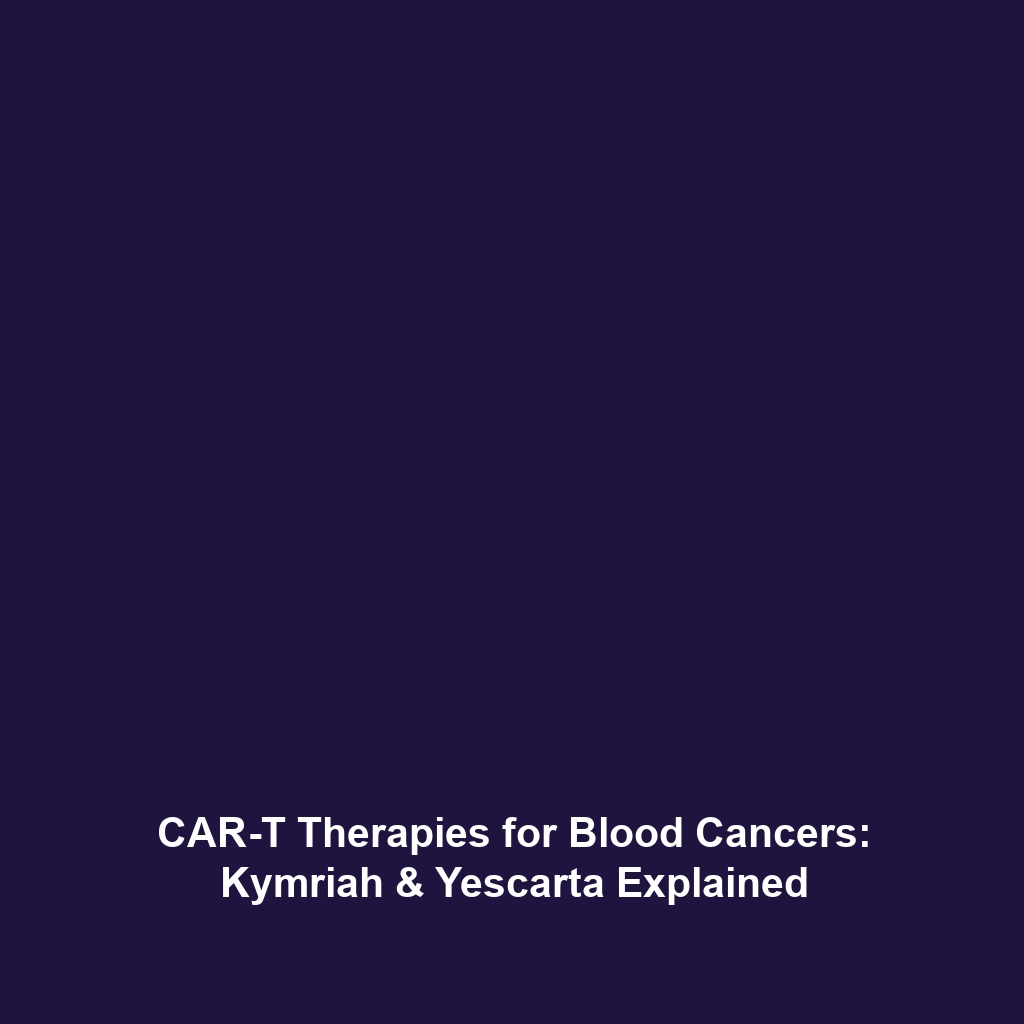Approved CAR-T Therapies for Leukemia, Lymphoma, and Multiple Myeloma
Introduction
Chimeric antigen receptor T-cell (CAR-T) therapy represents a groundbreaking advancement in the field of immunotherapy, particularly for cancers like leukemia, lymphoma, and multiple myeloma. These therapies harness the body’s immune system by genetically modifying T cells to target and eliminate cancer cells. The significance of approved CAR-T therapies is immense, offering new hope to patients with hematologic malignancies who have exhausted other treatment options. Understanding CAR-T therapies is crucial for grasping the modern landscape of Immunotherapy & Cancer treatment.
Key Concepts
Understanding CAR-T Therapy
CART-T therapies involve several key concepts:
- Genetic Modification: T cells are extracted from a patient’s blood and modified to express CARs that recognize specific cancer antigens.
- Target Antigens: Each CAR-T therapy is designed to target specific proteins on the surface of cancer cells, such as CD19 for B-cell leukemias and lymphomas.
- Tumor Microenvironment: The tumor microenvironment plays a significant role in the effectiveness of CAR-T therapies, influencing how well these modified T cells can survive and function.
These major concepts highlight how CAR-T therapies fit into the broader category of Immunotherapy & Cancer, aiming to enhance the body’s natural defense mechanisms against malignancies.
Applications and Real-World Uses
Approved CAR-T therapies have shown remarkable effectiveness in various real-world scenarios:
- Acute Lymphoblastic Leukemia (ALL): CAR-T cell therapy targeting CD19 has demonstrated significant complete response rates in pediatric patients.
- Diffuse Large B-Cell Lymphoma (DLBCL): Treatments like axi-cel have transformed treatment outcomes and increased survival rates for patients with relapsed/refractory disease.
- Multiple Myeloma: Emerging CAR-T therapies are targeting BCMA, showing promise in managing this difficult-to-treat malignancy.
These examples illustrate how approved CAR-T therapies for leukemia, lymphoma, and multiple myeloma are making significant inroads in the field of Immunotherapy & Cancer.
Current Challenges
Despite the potential of CAR-T therapies, several challenges persist, including:
- Cost: CAR-T treatments are highly expensive, making them inaccessible for some patients.
- Side Effects: Increased risk of Cytokine Release Syndrome (CRS) and neurotoxicity can complicate treatment.
- Durability of Response: Not all patients achieve long-term remission; some experience relapse.
- Scalability: Manufacturing these therapies at a large scale while ensuring quality and efficacy remains a hurdle.
These challenges highlight the ongoing need for research and innovation in the application of CAR-T therapies in the context of Immunotherapy & Cancer.
Future Research and Innovations
The future of CAR-T therapies appears promising with several innovations on the horizon:
- Next-Generation CAR-T Cells: Research is underway to develop CAR-T cells that are less prone to exhaustion and can target multiple antigens simultaneously.
- Combination Therapies: Combining CAR-T with other immunotherapeutic strategies, like checkpoint inhibitors, may enhance efficacy.
- Off-the-Shelf Products: Efforts to create allogeneic CAR-T cells could provide patients with quicker access to treatment.
These developments could significantly impact the future landscape of Immunotherapy & Cancer.
Conclusion
Approved CAR-T therapies for leukemia, lymphoma, and multiple myeloma represent a significant leap forward in the field of Immunotherapy & Cancer. They provide new hope for patients facing challenging diagnoses and highlight the importance of ongoing research and innovation. As we continue to understand and develop these therapies, their role in clinical practice will only expand. For further reading on related topics, consider exploring our articles on immunotherapy advances and the future of cancer treatment.

